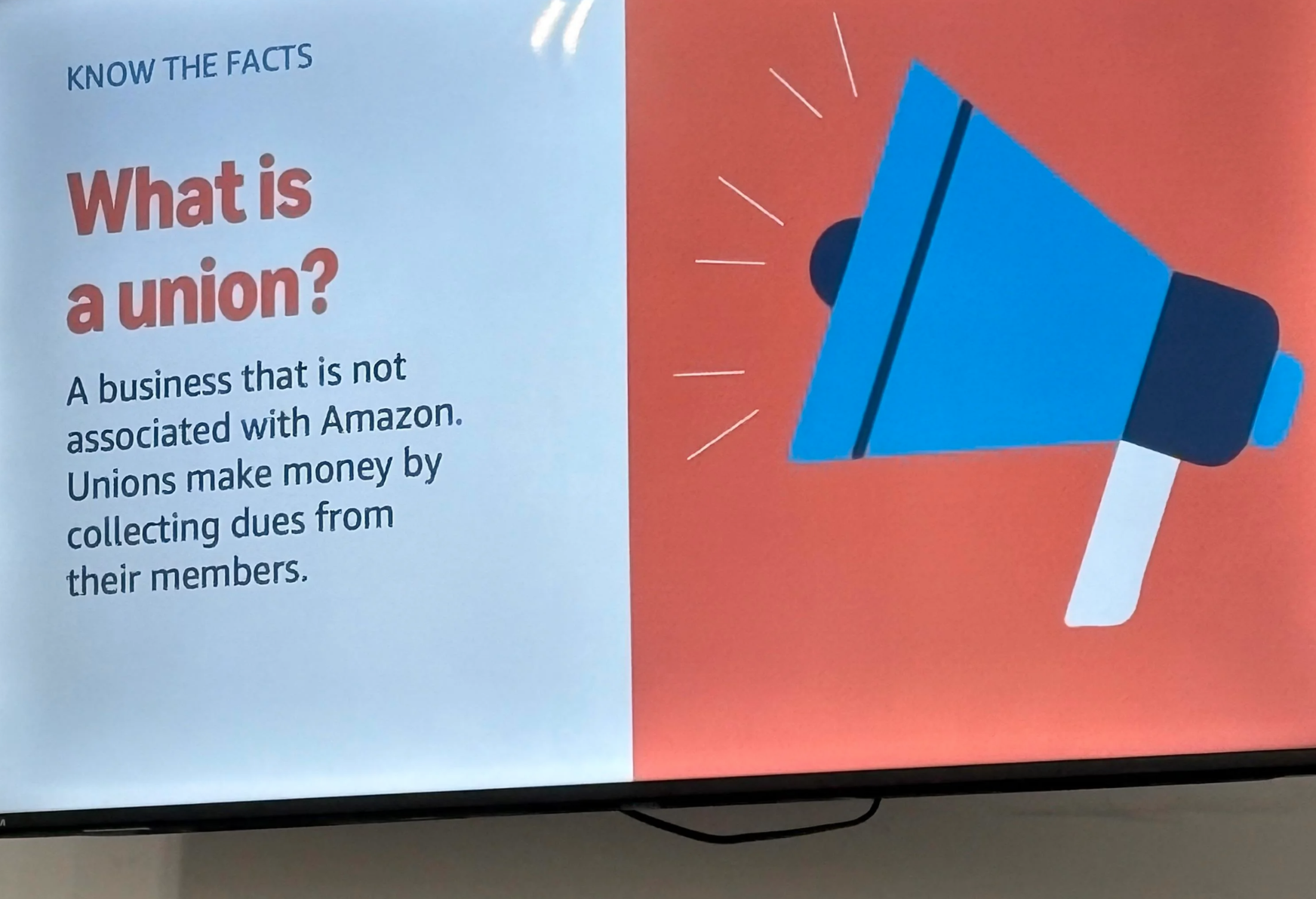Amazon argued to the National Labor Relations Board that its union-busting tactics are “protected by the First Amendment,” in a filing obtained by 404 Media.
Amazon’s filing, which was in response to an NLRB complaint, was filed last Tuesday as part of a long-running case about whether Amazon is a joint employer of its delivery drivers. Amazon argues it is not the employer of these drivers because of its Delivery Service Partner (DSP) system—Amazon contracts third-party delivery companies as DSPs, which in turn employ drivers.
When a group of delivery drivers unionized with the Teamsters in 2023, Amazon refused to bargain with the union, claiming it did not have to because it was not an employer. In September, however, the NLRB filed a complaint against the company, officially ruling it as a joint employer, which means that Amazon has just as much responsibility over its drivers as the DSP that employs them.
In its answer to the complaint, Amazon denies that it is a joint employer, though it is worth noting that the company has hired anti-union consultants specifically to target its delivery drivers.
The complaint lists a series of union-busting statements by Amazon managers, including threatening to terminate employees and promising better benefits if they did not unionize. In response, Amazon wrote that, “All the statements Amazon allegedly made to [DSP] employees were protected by the First Amendment to the U.S. Constitution.” The First Amendment protects freedom of speech, assembly, religion, petition, and the press.
The NLRB complaint also seeks an order requiring that Amazon publicly post the NLRB explanation of employee rights for one year; provide laid-off workers with a “neutral letter of reference” that says their performance was “satisfactory” and does not mention “the circumstances surrounding their termination of employment”; permit the NLRB to train management on unfair labor practices; and provide the regional board director with written proof of compliance.
In response, Amazon argues that these specific requirements, “if granted, would violate the First Amendment to the U.S. Constitution.”
Amazon also denies that it owns the building where the unionization took place. It then claims that the DSP in question, Battle Tested Strategies, bargained with the union illegally, so Amazon did not have to recognize the union to begin with.
“Because BTS unlawfully recognized, bargained with, and executed a collective bargaining agreement with [two groups of Teamsters], without either union or both unions demonstrating to BTS uncoerced majority support, neither Amazon.com Services LLC nor Amazon Logistics, Inc. was obligated to recognize and bargain with either union,” Amazon wrote.
The NLRB complaint also alleges that Amazon “held a mandatory or effectively mandatory captive-audience meeting to discourage union activity,” where members of management “threatened employees with job loss.” Captive-audience meetings are information sessions where a company brings in lawyers, executives, or union busters to explain the unionization process to workers. These meetings are almost always designed to discourage them from unionizing. A growing number of states have deemed them illegal, and the NLRB is considering doing the same.
The company argues that deeming captive-audience meetings illegal would constitute a First Amendment violation.
“The meeting referenced in [this complaint] was voluntary, but in any event, any Board Decision and Order concluding that it is unlawful to conduct mandatory meetings about unionization or unions or any particular union or about the actual subjects of the meeting in question would violate the First Amendment to the U.S. Constitution,” Amazon wrote in its response.
Amazon did not respond to a request for comment.
“It’s a ridiculous argument,” said Seth Goldstein, a lawyer at Goldstein & Singla PLLC, who represents workers in unionization efforts. Goldstein previously represented Amazon workers who unionized in a Staten Island warehouse. “What I don’t understand is, the First Amendment is about government: the government can’t restrain free speech. In this case, are they really saying that the NLRB, as a government agency, is somehow limiting free speech? Constitutional rights are usually outside of the framework of private employers. I think it turns everything on its head.”
The company has previously hosted captive-audience meetings when its workers have tried to unionize. When warehouse workers in Albany, New York were organizing to join the Amazon Labor Union in 2022, the company hired anti-union consultants paid $3,200 per day to persuade workers against doing so. The union lost the election by a two-to-one margin.
The company also regularly shares anti-union information in its warehouses. One Amazon worker in Southern California recently posted photos of anti-union slides on a TV near the entrance to their warehouse. One slide defines a union as “a business that is not associated with Amazon. Unions make money by collecting dues from their members.” Another slide reads, “Hearing promises that sound too good to be true? They probably are.”
The poster said there had not been any meeting or announcement, so they weren’t sure why the company decided to put up the slides, but that there had been picketers outside their warehouse some weeks ago.
Amazon has argued that the structure of the NLRB is unconstitutional before, joining a slew of companies filing federal lawsuits against regulatory agencies. It echoes those arguments in its defenses, claiming that the power of the NLRB General Counsel is “improperly insulated from the President’s oversight and removal power” and violates the Due Process clause of the Constitution.
“This is part of the ongoing constitutional attack by these corporations, trying to get it to the Supreme Court,” Goldstein said.


